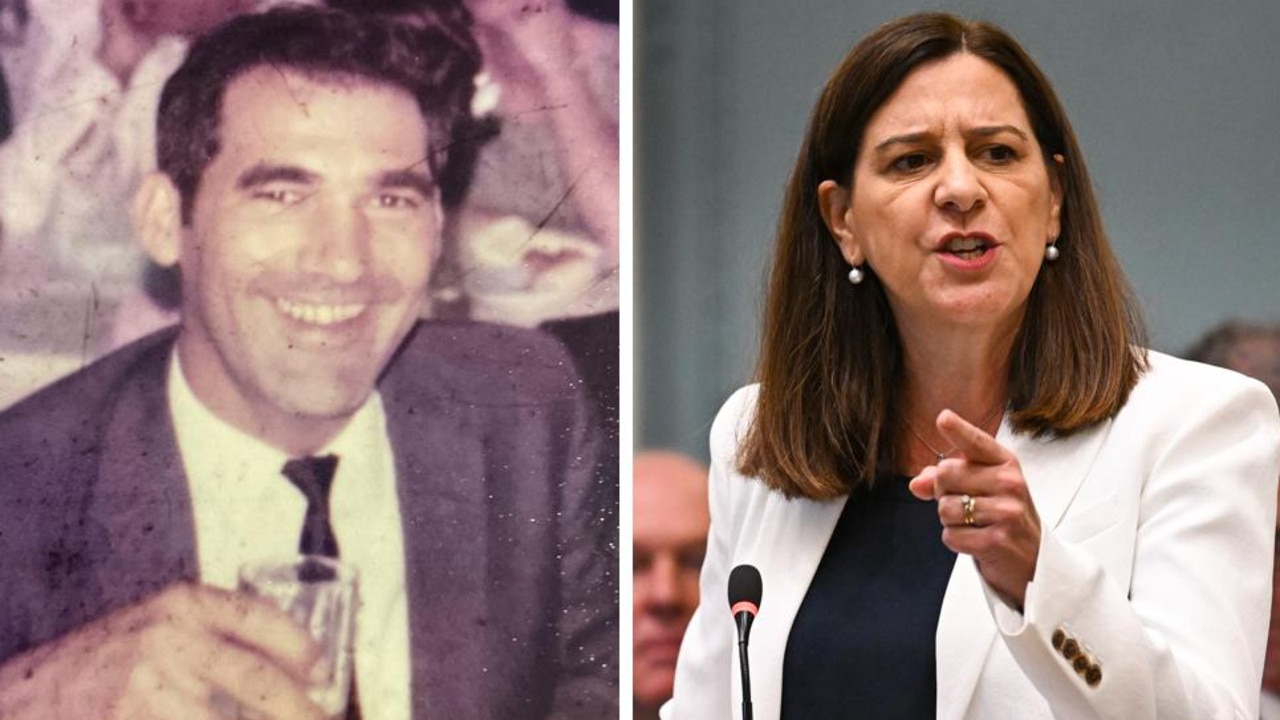‘Higher risk’: Cameron McEvoy and wife Madeline reveal pregnancy complication
Swimmer Cameron McEvoy has had an extraordinary year in the pool, but he says his heroics at the Paris Games “pale in comparison” to the challenges his new wife Madeline has faced.

News
Don't miss out on the headlines from News. Followed categories will be added to My News.
Cameron McEvoy is walking on air.
The Olympic swimming champion is at the gym holding on to a bar overhead, his feet dangling an inch above the ground. He takes four controlled steps high into the air, lifting his athletic frame until it’s completely horizontal, pauses, then takes four invisible steps back down.
It’s part of his innovative training regimen, a now winning formula fast becoming known as the McEvoy Method, focusing on strength and mobility training in the gym instead of high-volume pool work.
McEvoy made a comeback for the ages and a swim for the history books when he became the first Australian man to win gold in the 50m freestyle event at the Olympics in Paris last year.

It was 21.25 seconds of “bliss”, he said post-race. To do it at 30 years of age after a long swimming career and a run of disappointments in London, Rio and Tokyo made it all the more spectacular.
It was a career-defining moment – a culmination of self-belief and commitment to try something new. An Olympic dream, almost determined out of reach, come true.
As if things couldn’t get any better, McEvoy’s personal life has been blossoming too. After getting engaged to his long-time girlfriend Madeline Bone, 28, late last year, the couple married in January at a ceremony at Customs House, Brisbane.

To top it off, last month they shared the happy news they’re expecting a baby boy. While it would be easy for the father-to-be to hang up his jammers and go out in a blaze of glory, he is far from done in the pool. If anything, he feels he’s just beginning.
In late April, McEvoy won the 50m freestyle and 50m butterfly at the Australian Open Championships held at the Brisbane Aquatic Centre.
“I wasn’t expecting to go that fast. I’ve only been back swimming properly in the pool for three weeks so I didn’t expect to have that speed and race fitness. I think it disproves a lot of myths in the sport about how much you need to be in the water in order to maintain anything you develop. About 90 to 95 per cent of my training efforts have been in the gym, not in the water,” he says.
McEvoy is now planning to compete in both events at the 2028 LA Olympics when 50m sprints in butterfly, breaststroke and backstroke are included for the first time.
It’s a sprint revolution, and McEvoy couldn’t be more ready for it.
As he prepares for the World Championships in Singapore in July, he has his sights set on a new goal – breaking the world record and swimming 50m in sub-21 seconds.
“I’d love to be the first person to go under 21 seconds without one of the super-suits that got banned in 2009. That’s my biggest goal right now,” he says.
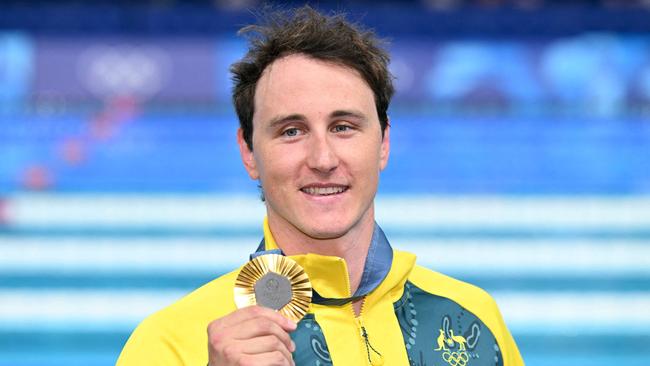
Rewind to 2021 after the Tokyo Olympics and McEvoy was in a very different place. Aged 27, he had failed to make the finals in the 50m and 100m freestyle events.
It was meant to be his shot at redemption after a disappointing performance in Rio in 2016 where he placed seventh in the 100m free, his pet event, despite being the favourite. Instead that night belonged to rising star Kyle Chalmers, who managed to overtake his Aussie teammate in a shock win and claim his first Olympic gold aged 18.
It followed another surprise loss in London four years earlier when the Australian men’s
4 x 100m freestyle relay team placed fourth.
Burnt out and despondent after his third unsuccessful attempt at Olympic glory in Tokyo, McEvoy needed a break. Whether he would walk away for good or not from the sport, he didn’t know. What he did know was that he couldn’t go back to doing things the way he’d always done them and expect a different result.
“I’d gotten to the point where I knew that the traditional training I was doing was absurd and there had to be a more efficient way.
“I didn’t know what that was at that time, but it was enough to be motivated enough to go ‘Right, I can either quit and that’s it, or I figure something out, I give it a go, and if it doesn’t work then I can be okay with the career I had.’ It was kind of like whatever happens, I get closure,” he says.
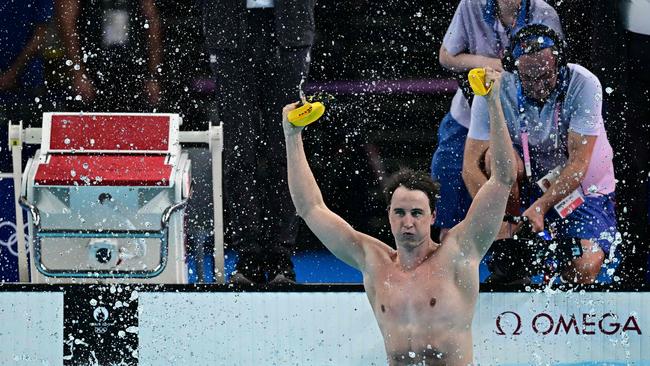
Growing up on the Gold Coast, McEvoy started swimming at the age of four. His older brother, Hayden, and younger sister, Brittany, also represented Australia in swimming on junior teams. He says they couldn’t have done it without the support of their parents Rod, a courier, and Janine, a psychologist.
“I wouldn’t be in swimming if it weren’t for them pushing me – if it wasn’t for my dad getting up at 4.30 every morning just to get us on pool deck,” he says.
A swimming prodigy, McEvoy broke Ian Thorpe’s records in the under-16 and under-17 age categories and won three medals at the 2011 World Junior Swimming Championships. He seemed destined to win Olympic gold but for years the podium remained out of reach.
After taking a sabbatical for just over a year after Tokyo, McEvoy decided to give it one last crack – this time, doing it his own way.
A physics and math graduate from Griffith University, which earnt him the nickname The Professor, McEvoy applied his scientific knowledge to research and develop a new training regimen that focused on quality over quantity with the support of the Queensland Academy of Sport. For the record, he isn’t an astrophysicist, as has been widely reported.
“Going through a physics and mathematics degree, it teaches you how to solve problems and develop a toolbox of things to use with respect to a given problem. I had the problem of ‘I want to get from A to B, that’s 50 metres, as fast as I can in the water. How do I do that?’ I basically used that skillset to go about figuring out how to learn from other fields and other sources, and then apply that to what I needed to do in myself,” he says.

Taking inspiration from training philosophies in the strength and track and field worlds, McEvoy cut his training down to a maximum of 2km a week in the pool.
Depending on where he is in the season, he spends between three to eight hours in the gym each week doing high intensity strength and mobility work, building his body into a lean, mean, swimming machine.
“Traditionally you would do 40km a week in the pool and maybe a kilometre of that is done at race pace,” he says.
“But usually you’re too fatigued to actually be close to race pace.
“In a 50-week season you might only have five weeks where you’re actually replicating what you’re going to do in the race.
“The rest is at intensities that are not close enough to get any meaningful adaptation in that sense for sprint swimming, so I’ve cut a lot of that slow, non-specific swimming completely out and I seek to try and find a volume of swimming at as close to race intensities as I can.”
For the longest time, the math didn’t add up. But in a world where those who ask questions are told to toe the line or get out, McEvoy learnt to ignore his inner-voice and believe maybe, just maybe, he didn’t have it in him.
Not anymore.
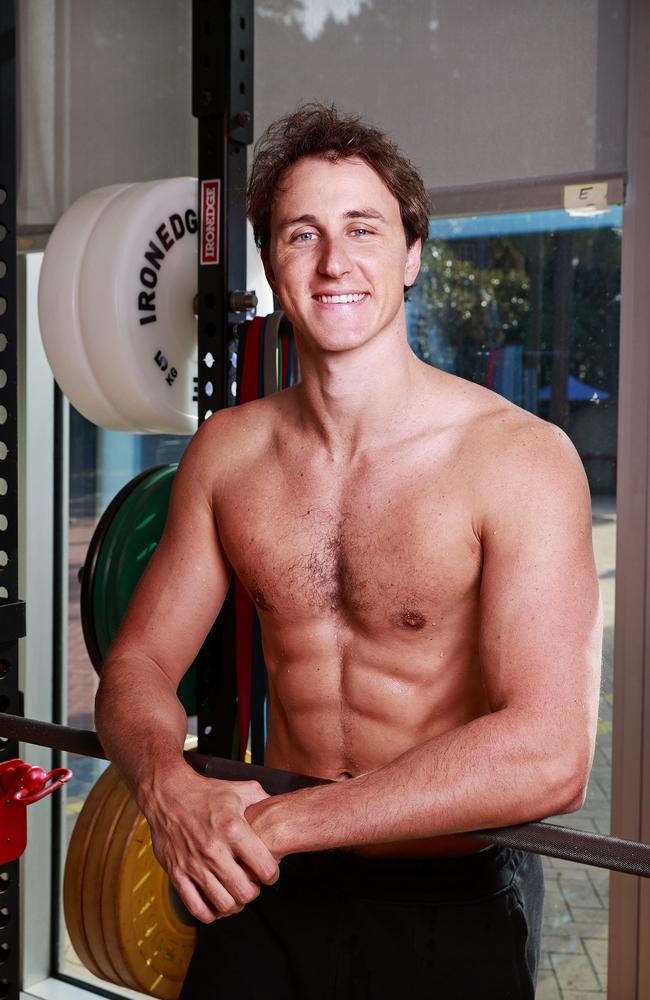
“I’m inquisitive. I’m curious about how things work, why they work, understanding things. And until I started doing this there was never an avenue in which you could do that in the sport,” he says.
“As much as you can make the argument that I had to do what I did prior to this in order to get to this point, I really wish I could have done it earlier. For most of my 20s I could have done this type of training and I certainly believe I would have been a lot faster.”
Finding a coach who was willing to work with him using his training method wasn’t easy.
“I went to a few coaches with my pitch, my ideas, what I wanted to do, and most of them left me on read,” he says.
“I sent them a 30-page document I wrote that described everything and never got a response. Basically no one wanted to touch me with a 10-foot pole,” he says.
At the eleventh hour, McEvoy was introduced to coach Tim Lane. It was a Casablanca moment – the beginning of a beautiful friendship and a bright new chapter.
“Tim was like, ‘Look, I’m really intrigued by the ideas you’re putting forward, but all I care about is that whatever you decide to do with me, your relationship with the sport is better than when you started.’ That was his only starting point and prerequisite,” he says.

“He is my main mentor, not only with training and with general sport advice, but life advice as well.
“He’s one of my best mates now, which is a privilege, because I never would have come across him if I didn’t take the risk to do this type of training,” he says.
While he emphasises his training regimen is highly individualised, McEvoy has been open to sharing it in the hope it will help other athletes who aren’t thriving under traditional methods.
“Science in sport is really primitive, there’s a lot of progress to be made … It can come down to what athlete has what genetics to determine what type of training to do, and no one really knows how to figure that out,” he says.
McEvoy, who fields dozens of messages a week from athletes around the world, is looking to find a way to make his approach more accessible, whether through a YouTube series or a different medium.
“I know so many people who leave the sport with such a bad relationship to the sport,” he says.
“They end up hating it at the end because of the amount of work they have to do and their particular genetics don’t comply with that type of level of endurance work.
“They’re more sprint-based people, power people, and they would go a lot better with different approaches. The fallout is usually that the swimmer didn’t train hard enough, it’s not in their character, they didn’t work hard enough, which I think is bullshit.
“I want to get these ideas out there, not only as an example of me doing it myself, but to allow people to have a potentially new pathway to rewrite their relationship with the sport and to come away from the sport at least still loving what they’ve dedicated the better part of their entire life to doing,” he says.
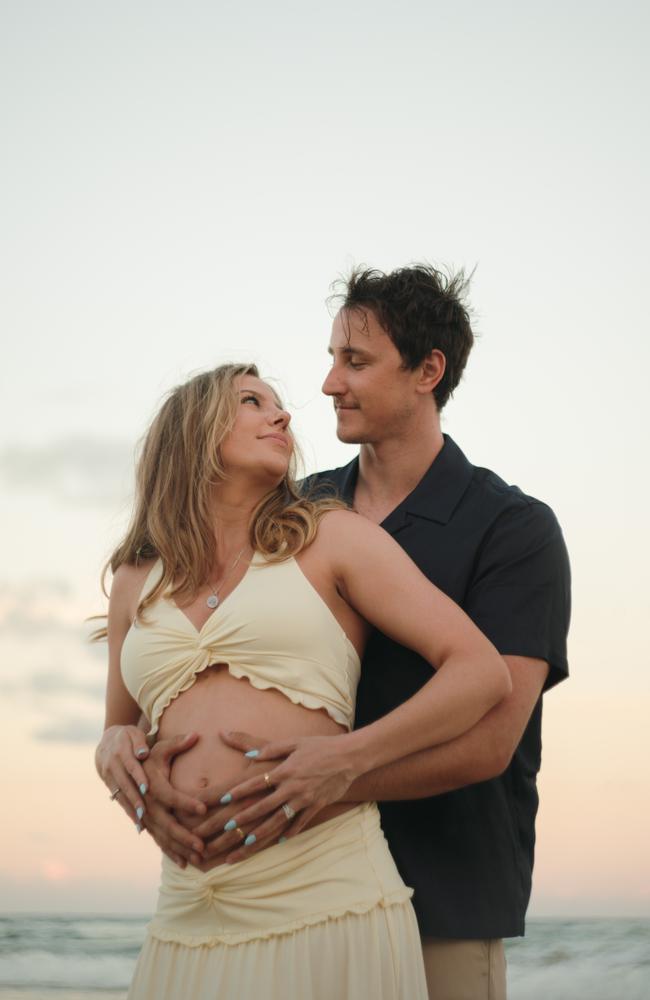
McEvoy has a lot to look forward to both in and out of the pool.
In their home in Brisbane’s West End, he and Madeline are eagerly preparing for the arrival of their baby boy in June or July.
“I’m extremely excited for it, a little bit nervous as well, but I’d say overwhelmingly excited,” McEvoy says. It’s the next step for the loved-up couple who met online during the pandemic in 2021.
“Our first date was walking my groodle, Apollo, up and down the beach, just doing laps back and forth and chatting,” he says.
They’ve been by each other’s side ever since, living life to the full and supporting one another through their own individual challenges.
“When we met I was probably at the lowest point of my career in terms of both my performance and my relationship to the sport,” he says.
“Madi was around during the entire process of me trying to figure out this new training method and what to do with the sport too.
“She was, for the large part, a sounding board for a lot of my ideas.”
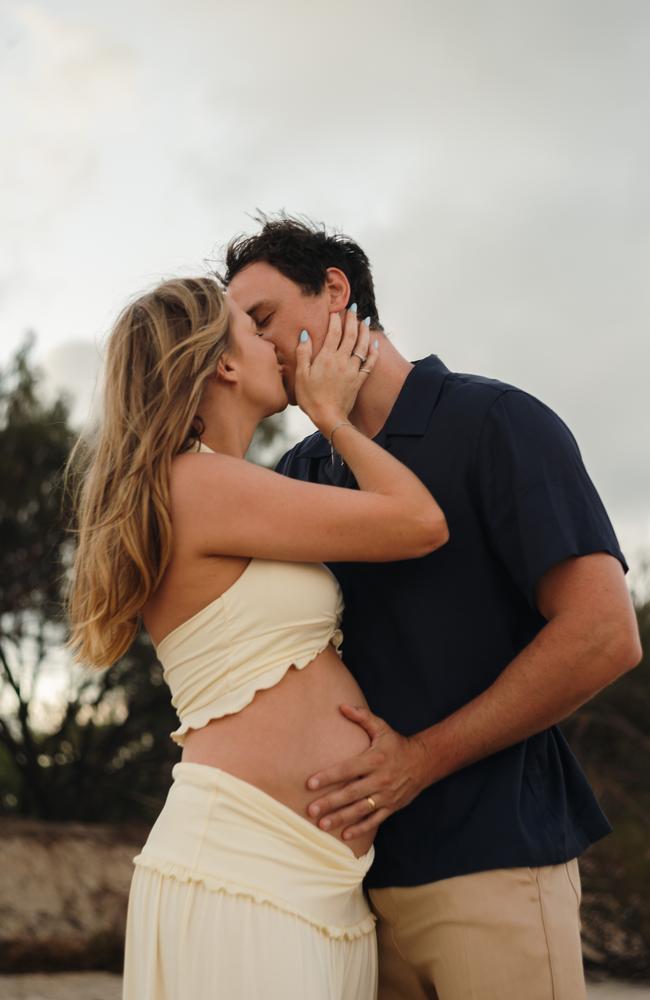
A nurse and second-year PhD candidate at Griffith University studying wounds and using machine learning to predict surgical complications, Madeline has faced big challenges of her own throughout her life.
Born with a pulmonary valve defect, she has had four open-heart surgeries including receiving a replacement pulmonary valve when she was 17.
“It’s something that she has to monitor yearly, and there will come a time when her replacement valve has to be replaced again.
“Carrying a baby is a little bit more of a higher risk given her situation, but she’s working with an insanely good team at the Mater Hospital and we’re very confident that we’re in very good hands and feel very safe,” McEvoy says.
“I think of what I’ve been through in my swimming and it pales in comparison to what Madi has done. She still gets up every day very positive about where she’s going, always looking to help anyone around her. She’s just the most caring and beautiful soul that you could come across.”
It’s early days, but McEvoy is already thinking about what kind of father he hopes to be to his son.
“I want to guide him to be basically the best version of his own character that he can be and to have resiliency. So no matter what he’s going to face, to get over that mountain to the other side.
“That’s going to serve him well no matter what part of life it’s in, whether that’s friendships, relationships or work,” he says.

If McEvoy’s next mountain had a name, it would be sub 21 seconds.
American Caeleb Dressel set the world textile (non super-suit) record of 21.04 seconds in 2019. McEvoy currently holds the second-fastest textile time of 21.06 seconds set in 2023 at the World Championships in Japan, when he broke a 14-year national record and became the oldest Australian to win a swimming world championship.
Not only does he want to go under 21 seconds, but beat the official world record time of 20.91 seconds set by Cesar Cielo in 2009 at the last event allowing super-suits in Brazil.
“Right now I’m 0.15 of a second away from that world record. I now have that little bit of extra confidence to see if I can discover something that gives me that extra pop,” he says.
Although the Brisbane Olympics are still seven years away, he hasn’t ruled them out either. “It’s on the radar. A lot can happen between now and then, but if I’m motivated enough and I’m in good health I see no reason why I won’t give it a crack,” he says.
While breaking the world record is an exhilarating prospect, McEvoy is philosophical about achieving his next goal and has his priorities – family first, love of swimming second – in order.
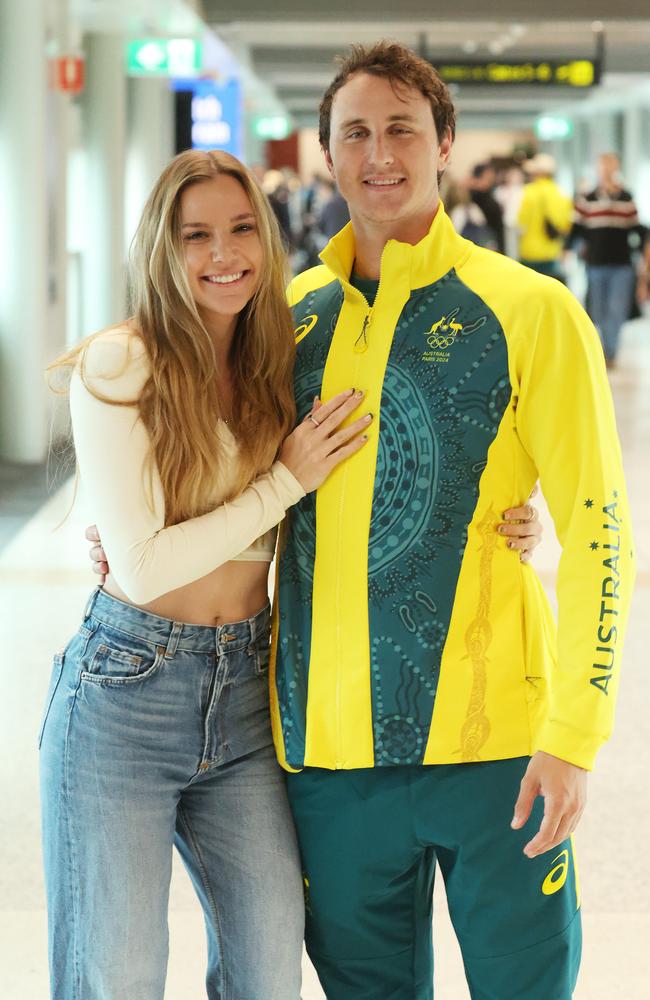
“There’s a Chinese phrase, Wu wei, which means effortless action, like water running down a creek type of thing. That’s what swimming feels like now. You dive in and it just kind of flows,” he says.
“With this approach now, the freedom it gives me, the longevity it gives me in the sport, but also the ability to take it in whatever direction I want, can’t be understated.
“How you relate to the sport is as important as how you do the sport,” he says.
Whether gliding through water or walking on air, there’s no telling how far McEvoy will go.
In partnership with Griffith University
Originally published as ‘Higher risk’: Cameron McEvoy and wife Madeline reveal pregnancy complication




